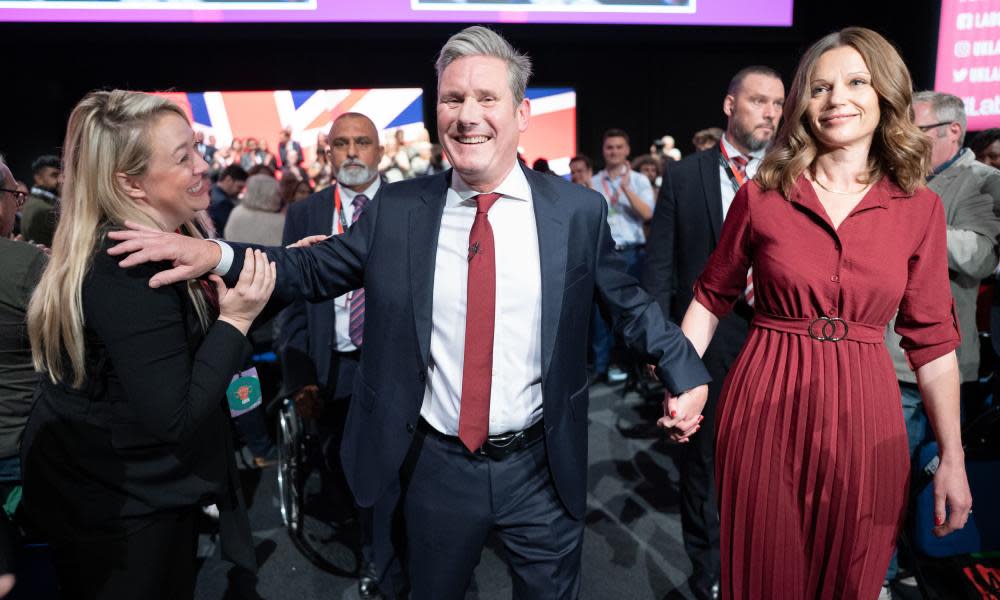Starmer takes a step towards No 10 – but he has a long way to go yet

In Keir Starmer’s first radio interview after becoming Labour leader he was asked what his first priority would be in opposition. From a broad slate of possible responses – social justice, a stable economy, investing in public services – he didn’t hesitate. “To win the next election.”
At the time, his answer was, frankly, laughable. Labour had just suffered its biggest election defeat in more than 80 years and the party was divided, exhausted and traumatised by the defeat. But life, and in this case politics, comes at you fast.
In the early days of 2020, Starmer confided to allies his three-step plan for getting the party back into a position where it was fit for power. First, he would root out antisemitism and neutralise the left. Next, he would introduce himself to the public and try to earn Labour the right to be heard. Both, to a greater or lesser extent, he has achieved.
The final part, setting out his ideas and vision for government and winning back the trust of voters who in 2019 thought they were walking away from Labour for good, is the trickiest. But he emerges from Labour’s conference this week one step closer.
In his conference speech this year, he drew clear dividing lines with the Tories on economic competence and the NHS, while parking Labour’s tanks on their lawn with a new points-based immigration system and home ownership. He also attempted to neutralise Brexit, promising he would “always” try to make it work.
Many people, while not tuning into the detail of party conferences, will have caught a snippet on the television or radio of the party belting out the national anthem, or of Rachel Reeves’s scathing take-down of the government’s economic recklessness, or of Starmer looking like a plausible prime minister.
From that perspective at least, the week has been a success. The palpable scent of power was back in the room for the first time in years – demonstrated by the corporate sponsors, party donors in the front row, foreign media and the smattering of celebrities including Gary Neville and Ben Elton touring the conference.
Starmer has done what he needed to do: present a future Labour government as a credible alternative to the chaotic decline of the Conservative party. The week has been brisk and businesslike and even (whisper it) a little bit boring. But as one shadow cabinet minister said: “If boring means serious and capable then we’re fine with that.”
The party is strikingly more self-confident, with Starmer and his top team now genuinely believing they could make it to No 10 in less than two years’ time. Yet he still has a long way to go to make it actually happen.
Some of the issues are internal. In a political world where everybody likes to feel indispensable, there are grumblings among some of his shadow cabinet about the level of access they get to the party leader back at Westminster. One MP said: “I never see him. Sometimes I wonder whether he’s a hologram”.
While close aides insist that Starmer has demonstrated his political instincts over the last two years, some colleagues still question his capacity to make a speedy judgment call. Others are frustrated that he has been too cautious: tinkering round the edges on policy and prioritising the wooing of swing voters with fiscal restraint over what they regard as desperately needed funding commitments.
Some MPs feel that too many decisions are being taken without a politician in the room, with Starmer too readily swayed by advisers. One shadow cabinet minister said: “There are people around him who push him to be way more rightwing than he actually is. Once he gets back in the room with politicians he always goes back to his instincts.”
Despite appeals to avoid complacency, some MPs and aides appeared lost in a bubble of self-congratulation in Liverpool. When a YouGov poll that put the party 17 points ahead of the Tories dropped, it prompted champagne toasts. Others jubilantly reeled off a list of big Tory names, including Boris Johnson, Jacob Rees-Mogg, Iain Duncan Smith and Penny Mordaunt, who would lose their seats.
However, Starmer’s biggest obstacle to power remains cutting through in certain parts of the country that abandoned Labour at the last election. Multiple MPs claim that the party still isn’t in the game, that some voters in their patch lament the demise of Johnson while others are fed up with politicians of all stripes.
One shadow cabinet minister said: “We should win the next election, it has been handed to us on a plate this week with Kwarteng’s tax rises. The Tories have given us a huge opportunity. So if we can’t, then we should all pack up and go home.”
Labour has started to tell a story, and one that many people across the country seem to want to hear. But any election victory that is currently on track looks likely to be won by default, because the country has had enough of the Tories.
One Starmer ally said after his conference speech: “It’s the first few pages in the next chapter of the story of our return to power.”
If Starmer wants to win a majority that would be large enough to actually deliver the alternative future he says he wants, he has more pages to write.

 Yahoo Movies
Yahoo Movies 
